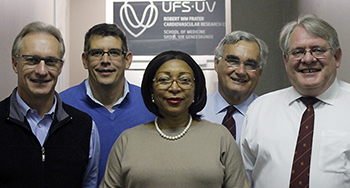Latest News Archive
Please select Category, Year, and then Month to display items
04 April 2024
|
Story Lunga Luthuli
|
Photo SUPPLIED
 Dr Juliet Kamwendo champions gender-inclusive climate action in Africa. Her expertise at the recently held AFR100 workshop highlighted vital steps towards sustainable and equitable development.
Dr Juliet Kamwendo champions gender-inclusive climate action in Africa. Her expertise at the recently held AFR100 workshop highlighted vital steps towards sustainable and equitable development.
Dr Juliet Kamwendo, Lecturer and Programme Director for Gender Studies in the Centre for Gender and Africa Studies at the University of the Free State, is spearheading efforts to integrate gender considerations into Africa's climate restoration agenda. Reflecting on her involvement, Dr Kamwendo stated, "This is particularly crucial, as women make up almost 50% of the population in Africa, and the depletion and degradation of land affect them disproportionately."
She recently served as a gender expert at the AUDA-NEPAD AFR100 workshop in Ouagadougou, Burkina Faso, from 25 to 29 March 2024. This initiative aims to restore forests and degraded land across Africa by 2030, with a focus on gender equality.
The workshop emphasised the integration of gender perspectives into the AFR100 project, acknowledging the disproportionate impact of land degradation on women. Dr Kamwendo's expertise highlighted the need to empower women in climate change interventions, addressing existing gender inequalities exacerbated by environmental degradation.
“Women – who are primarily responsible for household food security and water provision – bear the brunt of environmental degradation, leading to increased workloads, reduced income opportunities, and heightened vulnerability to climate-related disasters. Furthermore, the loss of forest cover and biodiversity further exacerbates the challenges faced by women, particularly in rural areas where they depend heavily on natural resources for their livelihoods,” added Dr Kamwendo.
Her participation highlights academia's crucial role in fostering inclusive and sustainable development, emphasising interdisciplinary collaboration to tackle complex environmental challenges. Through initiatives such as AFR100, stakeholders are working towards a more resilient and gender-responsive future for Africa.
UFS cardiac team leading with project
2017-05-31

Prof Peter Schultheiss of the Charité University in Berlin,
Germany, visited the Robert WM Frater Centre for
Cardiovascular Research at the UFS for a study regarding
cardiomyopathy, a significant cause of fatal heart failure
among Africans. From the left are Dr Glen Taylor,
Dr Danie Buys, Prof Makoali Makatoko,
Prof Schultheiss and Prof Francis Smit.
Photo: Rulanzen Martin
A team of cardiac doctors associated with the Robert WM Frater Cardiovascular Research Centre at the University of the Free State’s (UFS) Faculty of Health Sciences has commenced with a pioneering research project regarding idiopathic dilating cardiomyopathy.
An Afrocentric research focus
Prof Francis Smit, Head of the Department of Cardiothoracic Surgery at the UFS and Head of the Frater Centre, describes dilating cardiomyopathy as a heart muscle disease that is quite common, particularly among people of African descent. The disease weakens the heart muscle, which in turn leads to heart failure.
“To date there is no curable treatment for this condition and 50% of patients that have shown heart failure, died within a period of five years. The causes of this condition have been unknown in the majority of patients. But over the past few years major strides have been made where virus infections of the heart muscle or myocarditis have been identified as a possible underlying cause. Various genetic diseases are also linked to it,” says Prof Smit.
International collaborations ensure success
According to Prof Smit, the project is being run in conjunction with Prof Heinz-Peter Schultheiss of the Charité University and the Institute for Cardiac Diagnostics and Therapy in Berlin, Germany.
“We have been working on the project over the past 18 months and I have twice visited Prof Schultheiss in Germany. He is now visiting us in Bloemfontein. We have established a collaborative project focused on patients in central South Africa”.
Prof Schultheiss is a world leader regarding the diagnosis, pathology and treatment of dilating cardiomyopathy, says Prof Smit.
“He brings a lifetime of research experience to Bloemfontein and is internationally renowned as the father of myocardial or heart muscle biopsies.
“His pioneering work on the discipline has led to diagnostic accuracy that has induced purposeful and personalised treatment of dilating cardiomyopathy and has brought about dramatic changes in some subsets of patients’ life expectancy and their cure.”
Solving problems close to home
According to Prof Mokoali Makatoko, Head of the Department of Cardiology, there are more than 1500 new cases of heart failure identified annually at the Universitas Academic Hospital, of which approximately 30% are attributed to cardiomyopathy. “With the use of endomyocardial biopsies the team hopes to treat viruses unique to Southern Africa as well as other underlying causes of dilating cardiomyopathy.”
Prof Stephen Brown, Head of Paediatric Cardiology at the Universitas Academic Hospital, says children suffering from this disease never reach a mature age and those under his supervision will also be undergoing these tests. Various other departments at the UFS will also participate in this project. Profs Makatoko and Brown did the first four endomyocardial biopsies under the management of Prof Schultheiss during the past week. The results will be available in the coming weeks after which the project will be officially launched and patient recruitment will start in earnest.